Apple Salary Negotiation - How To Negotiate Your Apple Job Offer
If you're currently interviewing with Apple or you’ve received a job offer from them, congratulations! But before you celebrate, make sure you negotiate your job offer to ensure you receive competitive compensation.
This article outlines how to negotiate an Apple job offer using The Salary Negotiator’s tried-and-true negotiation strategy. And we’re not just saying that—just like when we help negotiate Meta job offers and many other companies, we’ve had a 100% success rate when helping individuals negotiate their Apple offers, meaning that every time we helped a client negotiate their Apple salary, Apple offered them more compensation.
Negotiating your compensation with a company such as Apple may seem difficult. And while it can be in some situations, it’s actually more straightforward than you’d think—especially when you use our strategy. And just remember: once you’ve received an Apple offer, that means they want you on the team, which gives you more leverage to negotiate your offer. Below, we dive into the components of an Apple job offer and then outline specific steps on how to negotiate better Apple compensation.
For those who prefer learning by video, we've also created an Apple salary negotiation video guide. Otherwise, this article provides the same Apple salary negotiation tips and strategies as the video.
Want to Negotiate Your Apple Offer? Get offer-specific guidance from an Apple Salary Negotiation Coach. We help career professionals negotiate competitive job offers.
Or leverage our Salary Negotiation Courses and Salary Negotiation Templates.
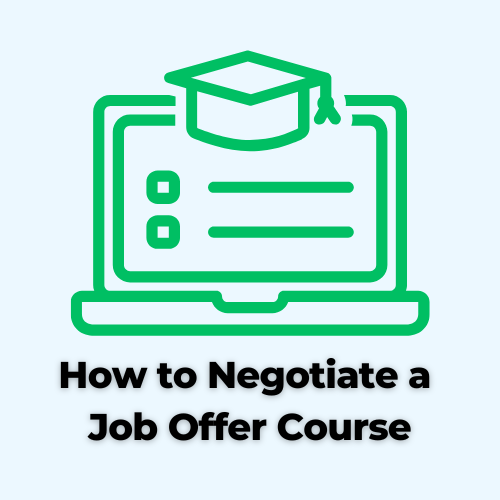 Job Offer Negotiation Course
Job Offer Negotiation Course
- Get our job offer negotiation strategies, templates, scripts, and guidance.
- Access our step-by-step lessons, compensation research guides, and tools.
- Access Now
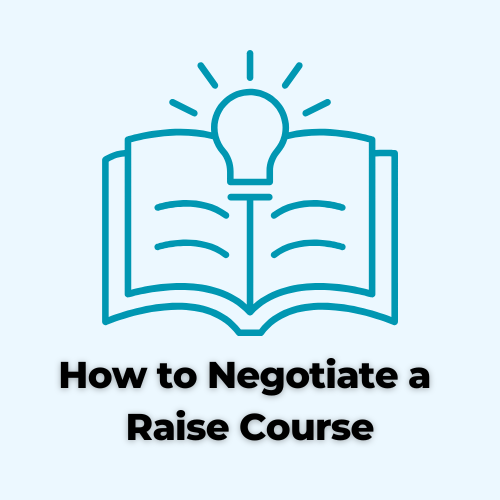 Raise Negotiation Course
Raise Negotiation Course
- Get our raise negotiation strategies, templates, scripts, and guidance.
- Access our step-by-step lessons, compensation research guides, and tools.
- Access Now
Understanding the Compensation Components of an Apple Job Offer
Apple is a leader in the tech industry, which means their salaries can be very competitive. Knowing what they are willing to pay for the role you've been recruited for is an important step in the salary negotiation process.
Your job offer at Apple will include multiple compensation components that make up your total yearly compensation. Understanding each of these components before you start negotiating will not only ensure you’re familiar with your entire offer, it will improve your chances of increasing your whole compensation package with Apple—not just one component.
The base salary is the number most people care about when they receive an offer, but it’s just one part of your overall compensation at Apple. Your current company may only offer you a base salary, which you receive via a recurring paycheck. But at Apple, employees also receive a yearly performance bonus, an initial equity grant, a sign-on bonus, and other benefits like health insurance and discounted Apple products. These additional components reflect Apple’s well-known history of compensating their employees well.
For example, here is what the total compensation of an Apple Senior Software Engineer Salary (ICT4) may look like in their initial offer:
Apple Software Engineer Salary
APPLE BASE SALARY
The first component in your Apple offer letter will be your base salary, which is the fixed guaranteed pay you receive in exchange for the work you do. It is not tied to your performance. Apple offers a competitive base salary that is comparable to other FAANG companies and larger tech companies such as Microsoft.
There is a base pay range for each role type and level with a set minimum and maximum amount. For example, the Apple software engineer salary for a Software Engineer Level 5 (ICT5) will have a different base salary than the same level Apple data scientist salary or Apple product manager salary, as well as different levels like a Apple director salary or Apple VP salary. Rarely will the offer come in at the top of the pay band, so your goal is to determine the pay range so you can negotiate up to the top end of that pay band.
APPLE YEARLY PERFORMANCE BONUS
All Apple offers typically include a yearly performance bonus. This target bonus is a percentage of your base salary, and it’s based on both personal and company performance. The target percentage ranges from 5% to 25% depending on your role level, but it’s important to ask the recruiter what the target percentage is for your role level. It’s possible to exceed this target percentage if the company outperforms its goals and you achieve a strong performance rating, but it’s best to assume the average payout.
While this is a sizeable sum that makes a big difference in your total yearly compensation, we have not found it to be negotiable because of the set target percentage for all roles. That said, if you negotiate a higher base salary, your performance bonus will also increase given that it’s a percentage of your base.
APPLE INITIAL EQUITY PACKAGE
Along with other companies in the tech industry, equity is a key component of Apple's compensation philosophy. New employees will receive an initial equity grant in their job offers. Apple’s equity comes in the form of restricted stock units (RSUs) which represent actual ownership of stock (i.e., you will receive shares of Apple stock) that will be transferred to you when the stock vest according to the Apple vesting schedule. The great thing about Apple compared to other tech companies is that the RSUs do not have a one-year cliff and will vest every six months over a four-year Apple RSU vesting schedule. This means you will get your first stock vest (12.5%) after 6-months vs. one year like most companies.
Apple Vesting Schedule
| Company | Vesting Period | Year 1 | Year 2 | Year 3 | Year 4 |
|---|---|---|---|---|---|
| Apple | 4 years (equal) | 25% | 25% | 25% | 25% |
The size of the grant is determined by the role type and level (i.e., is it for a Apple director salary, Apple hardware engineer salary, or Apple staff engineer salary), but just like the base salary, the equity component is fully negotiable.
Apple’s RSUs can be an extremely valuable form of Apple compensation, but they will fluctuate based on the market value of the company. If Apple’s share value goes up, you share in that increase, but if they go down, you share in that loss. The greatest consequence is that you will forgo the equity if you leave Apple before it vests. But with the 6-month Apple RSU vesting schedule it helps plan a future exit.
Many individuals focus on negotiating the equity portion of their Apple offer, but our clients have been successful in negotiating all compensation components (except for the yearly bonus). This is key to reaching the top end of the total compensation pay band.
APPLE SIGN-ON BONUS
Apple is known for providing sign-on bonuses, which is a one-time bonus that new employees receive as an incentive to join Apple or to cover any lost bonuses or unvested equity that they may give up at their current company. Unlike Facebook, Apple usually provides a Apple signing bonus in their initial offer. However, this is not guaranteed and sometimes you’ll need to negotiate to receive this component. The Salary Negotiator has helped all our clients receive an Apple signing bonus—even if they didn’t receive one initially.
It’s important to note that even if you don’t have a competing offer or you’re not walking away from money at your current company, you can still negotiate for a sign-on bonus. Apple’s sign-on bonus is paid after your first 30 days in one lump sum payment, but there are payback conditions tied to it—meaning you’ll need to pay back the bonus if you depart Apple within the first year. This is a very common practice for most sign-on bonuses.
APPLE EQUITY REFRESHER
Apple offers an equity refresher (more stock) to most employees and it will be based on the performance rating that you get every year. Most recruiters usually withhold the timeline and the expected yearly amount, so you should ask about both of those details during the negotiation. We don’t include this Apple compensation item in our total compensation calculation because recruiters typically shy away from the specific details, and because it’s speculative based on your performance.
BENEFITS AND PERKS AT APPLE
Apple is known for being a leader in the benefits and perks they offer, including health insurance, a top-tier Apple 401k match plan, relocation assistance, and Apple product discounts. However, Apple does fall short on vacation time in comparison to other FAANG tech companies, such as Amazon, Meta, Google, and Netflix.
New hires only receive 12 days of vacation time per year for the first two years. Then it bumps up to 15 days after your second year and you start receiving an additional day for every year you work. This is the most notable missing benefit compared to its competitors and a good detail to mention during the negotiation. You should be able to negotiate for more vacation days in an under-the-table agreement with your hiring manager (i.e., your manager lets you take more vacation without recording it).
Five Key Steps to Negotiate an Apple Job Offer
Before you begin negotiating your offer at Apple, it's important to understand how to navigate the process so you can increase your chances of success without jeopardizing the relationship.
It’s best to avoid starting the negotiation until you have an offer in hand. You don’t want to jeopardize your chances of receiving the job offer by negotiating too early with Apple, and you’ll have more leverage once the hiring team has selected you as the ideal candidate for the role. We highlight how to avoid starting the negotiation early and share our salary expectations scripts here.
Based on our experience helping hundreds of clients successfully negotiate job offers, we’ve identified five key steps that will help you navigate your Apple salary negotiation. While these are the key steps to a Apple salary negotiation, we strongly recommend you work with a Apple Salary Negotiation Coach to ensure success in your Apple offer negotiation by getting all of our strategies.
1) UNDERSTAND THE COMPONENTS OF YOUR APPLE JOB OFFER
This first step should be easy since we’ve already laid out the components of your Apple offer: base salary, performance bonus, initial equity grant, sign-on bonus, and any benefits and perks. Understanding the total compensation in your Apple job offer is the first step before attempting to negotiate your job offer.
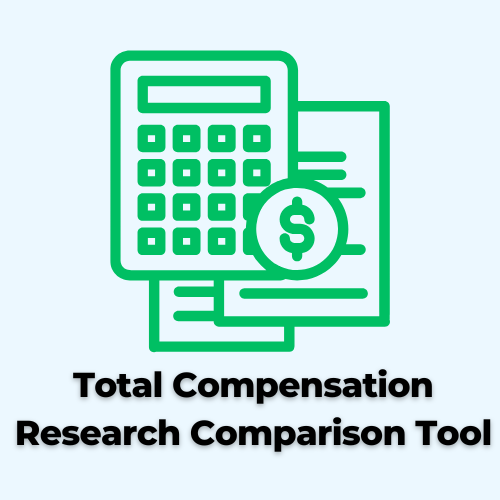
- Understand Total Compensation – Use our tool to break down and calculate the compensation in your job offer.
- Research & Compare Offers – Organize your compensation research and determine the right counter amount.
- Get Here
2) COMPLETE DUE DILIGENCE ON YOUR APPLE JOB OFFER BY ASKING THE RIGHT QUESTIONS
Asking good questions not only shows that you’re doing your due diligence, but it’s foundational for crafting an effective and successful counteroffer with Apple. These can include questions like: What was the target bonus achieved on this team in the last few years? Why does Apple offer fewer vacation days compared to its competitors?
Don’t skip this step. It allows you to pull additional data points from the recruiter that will strengthen your justification for why this offer is not competitive with your current/other opportunities and why they should consider your ask. Even if you think you already understand all aspects of the offer, it’s still a critical step for you to ask—you are already crafting your case to the recruiter for a more compelling offer. You can use our list of Strategic Questions to Build Negotiation Leverage if you need help finding the right questions to ask about your Apple offer letter.
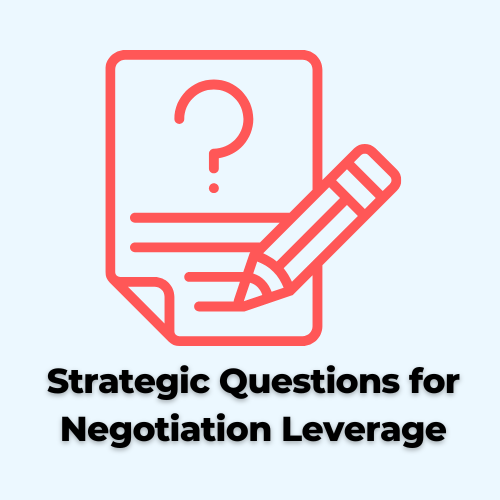
- Build Negotiation Leverage – Ask the right questions to strengthen your negotiation before sending a counter.
- Email & Phone Scripts – Get our list of questions to ask and what to say if the recruiter wants to chat through them.
- Get Here
While it’s normal to ask for more time to digest the offer, note that timing can be key in a salary negotiation with Apple, and actively working through the discussion will show the hiring team you’re interested in the role. We suggest starting this phase of the negotiation right after you receive the initial offer.
3) RESEARCH THE COMPENSATION RANGES TO IDENTIFY WHAT YOUR COMPENSATION AT APPLE SHOULD LOOK LIKE
Apple is a leader in the tech industry and will lean on data to make decisions. That’s why you must conduct compensation research to understand the role’s pay range, the strength of your offer, and how much you should ask for. You will need to look at the specific role (i.e., do you need to look Apple hardware engineer salary or product manager Apple salary) and where it’s located, whether that be in-person, hybrid, or remote.
There are many resources available to help you determine an appropriate salary, such as Payscale Glassdoor, or Salary.com, but be sure to use multiple resources and don’t rely on just one as the authoritative resource for what the role should pay. Be aware that these compensation ranges are publicly reported by current/past employees so the pay may differ from what they may offer new employees (i.e., the current employees’ total compensation is higher because Apple’s stock price increased over the past few years and their equity is more valuable), and it might be off if the employee didn’t correctly insert all compensation components. You can download our Total Compensation Research Comparison Tool to help you with your Apple compensation research.

- Understand Total Compensation – Use our tool to break down and calculate the compensation in your job offer.
- Research & Compare Offers – Organize your compensation research and determine the right counter amount.
- Get Here
As a new hire, you’ll usually want to push for at least the mid- to top-end of the total compensation range with Apple—we strongly believe that you should be paid the same as someone else in the same role regardless of your experience or background.
4) SEND A Apple COUNTEROFFER TO THE RECRUITER
Once you’ve completed preparing for the negotiation (the first three steps), you’re ready to send over a salary negotiation Apple counteroffer. This is where the negotiation officially kicks off!
In this step, you’ll present your ask to the Apple recruiter by referencing your research on the pay range and how the Apple benefits differ from other companies and/or your current role. This can be done over the phone, but we strongly recommend doing this via email (see our counteroffer drafts for examples). That way you can draft exactly what you want to say in a professional and friendly tone, and you don’t risk going off-topic if the recruiter interrupts or throws you a curve ball - it also ensures you have everything in writing. Lastly, it provides the recruiter with something that they can forward on and use internally to support why you deserve a higher offer.
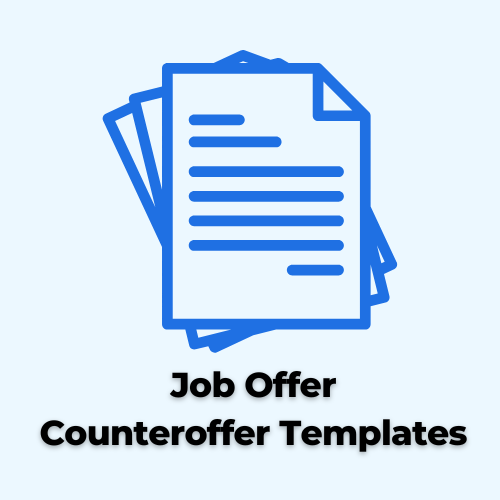
- Proven Counteroffer Templates – Built from hundreds of successful job offer negotiations.
- Negotiate with Confidence – Remove the guesswork with our professionally crafted counteroffers.
- Get Here
Just remember that you should always approach this step professionally and courteously, and you should treat the recruiter like a friend who is helping you make a comfortable transition to Apple.
5) HANDLE ANY OBJECTIONS FROM THE RECRUITER AND ACCEPT THE ROLE KNOWING YOU ACHIEVED THE BEST OFFER
Sometimes it only takes one counteroffer and the Apple recruiter will respond with an updated offer. Usually though, you’ll receive reasons from the recruiter for why the Apple hiring team cannot make any increases on the offer. If that happens, it’s best to see their “NO” as an objection that you need to overcome vs. an actual “NO” that you should just accept.
To handle an objection from an Apple recruiter, respond calmly by stating you understand their constraints, but you do have concerns and would appreciate it if they can take your thoughts back to their team for one last look (even if they say that their team will just say no). Use this approach regardless of the recruiter’s reasoning and follow all of our recruiter objection scripts if needed.
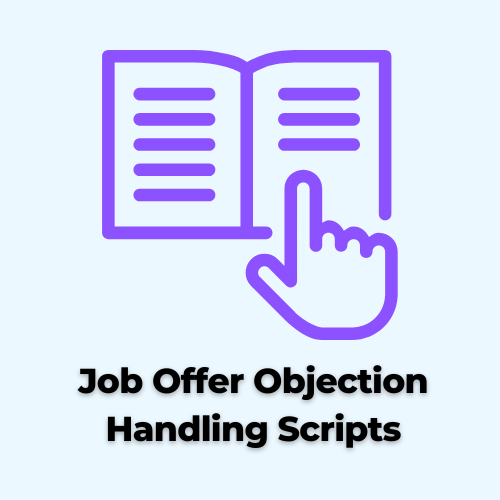
- Overcome Recruiter Pushback – Proven scripts to handle pushback and keep your salary negotiation on track.
- Communicate Effectively – Use expert responses to get recruiters to advocate for you with the compensation team.
- Get Here
You may have to handle a few objections but once they agree to take it back to their team, they should come back with an improved offer. Continue to remain respectful and professional as you navigate any objections, and take care not to be confrontational or demanding.
Once you receive an updated offer that fits your personal needs and matches the pay bands you researched, you should be ready to send an acceptance email and start planning the transition. Congratulations on the successful salary negotiation with Apple!
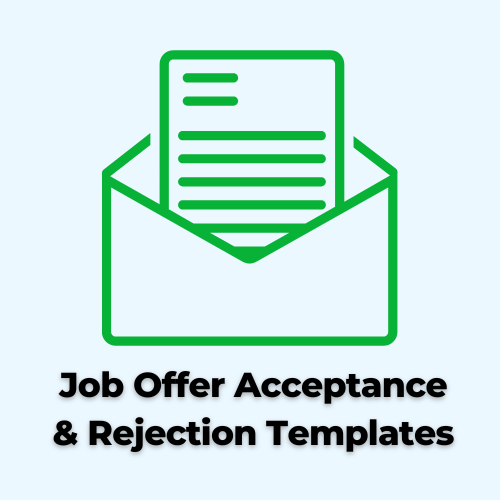
- Accept or Decline – Expert crafted job offer acceptance email and rejection email templates to share your decision.
- Professional & Genuine Tone – These help you communicate in a professional manner regardless of what you decide.
- Get Here
Negotiation Mistakes to Avoid During your Apple Salary Negotiation
Apple has a huge recruiting division given its size, and its recruiters are trained to get the best deal for Apple. They issue job offers every day and will have some tricks to get you to accept the offer without negotiating first. We’ve seen job seekers hit a few snags during their negotiations, so we’ve listed the key mistakes to avoid when negotiating an Apple offer.
AVOID SHARING SALARY EXPECTATIONS BEFORE YOU GET A JOB OFFER AT APPLE.
In our experience, sharing your salary expectations can work against you in receiving a fair offer from Apple. The Apple recruiter might tell you that if they know your salary expectations then they can try to find the best deal for both you and their team. But remember that they work for Apple, not you.
If you share a lower compensation than what they can offer, they are more likely to offer you that low compensation. If you throw out a number higher than what they could offer, there is a chance that they could decide to go with a different candidate. Further, it doesn’t make sense to discuss compensation before you learn more about the specific role, Apple’s benefits and compensation, and whether those aspects feel like a good fit for you. After all, you’re also interviewing them so use our salary expectations scripts to avoid sharing your pay details.
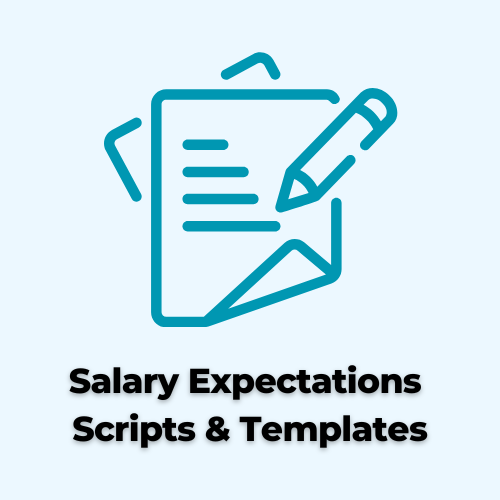
- Salary Expectation Responses – Scripts to overcome recruiter salary expectation discussions and pre offer calls.
- Avoid Lowballing Yourself – These call scripts and email templates will help you get a competitive offer.
- Get Here
DON'T BE AFRAID TO NEGOTIATE WITH APPLE.
Landing a job offer with Apple is a huge accomplishment. This may make you afraid to negotiate your job offer out of fear of offending the Apple hiring team or losing the opportunity. However, we’ve helped facilitate hundreds of successful salary negotiations, and we’ve never seen Apple pull a job offer because a candidate tried to negotiate. It's generally expected, regardless of the role level at Apple—whether it’s an individual contributor, Apple engineering manager salary, Apple director salary, or a Apple VP salary—you should negotiate your compensation package.
We strongly believe everyone should negotiate their Apple job offer before accepting—don’t let salary negotiation myths or hearsay talk you out of advocating for yourself in these discussions.
BE REALISTIC BY DOING YOUR RESEARCH.
Apple does pay very well for their roles but one needs to be realistic about what they will receive. Always understand what is included in your total compensation and research what Apple pays for your specific position before negotiating. This will help you to know what to expect and ensure you only push for compensation that the Apple team can realistically provide—plus avoiding any chances of damaging the relationship in these discussions.
Most Common Questions About Apple Offer Negotiation
Career professionals often ask us these questions about the Apple offer negotiation so we’d like to share our insights with you.
Can an Apple offer be negotiated?
Yes, it just takes the right salary negotiation strategies to get Apple to adjust their offer package. Negotiating an Apple salary is not only possible, but it’s recommended by our salary negotiation coaching team. If you approach the Apple salary negotiation with the right strategies then you should receive a more competitive job offer before starting the new role.
Does Apple let you negotiate salary?
Apple recruiters use a lot of tactics to deter you from negotiating an Apple offer, but they can be negotiated. You just need to overcome the Apple recruiter pushback and have a solid negotiation strategy like ours to negotiate an Apple salary.
How Long Does Apple Take to Give an Offer?
Apple is known among the big tech companies to have one of the slower hiring processes. The Apple offer letter process typically includes an initial phone screen followed by a hiring loop of multiple interviews. Once the Apple hiring loop is wrapped up, you can either go through team matching depending on the role or receive the offer if the team has already been identified.
Does Apple Give a Joining Bonus?
Apple does offer joining bonuses which are usually referred to as Apple sign-on bonuses for corporate roles and levels. The Apple sign-on bonus are paid out in a lump sum with your first paycheck as we explained in the Apple sign-on bonus section above.
Apple Salary Negotiation Coaching & Tools
Increasing your Apple compensation requires a deep understanding of the company’s compensation philosophy and the right salary negotiation strategy. Our expert Salary Negotiation Coaching or Courses and Templates, will help you navigate the Apple salary negotiation process and secure the top end of the pay band.
Or leverage our Salary Negotiation Courses and Salary Negotiation Scripts.
 Job Offer Negotiation Course
Job Offer Negotiation Course
- Get our job offer negotiation strategies, templates, scripts, and guidance.
- Access our step-by-step lessons, compensation research guides, and tools.
- Access Now
 Raise Negotiation Course
Raise Negotiation Course
- Get our raise negotiation strategies, templates, scripts, and guidance.
- Access our step-by-step lessons, compensation research guides, and tools.
- Access Now



